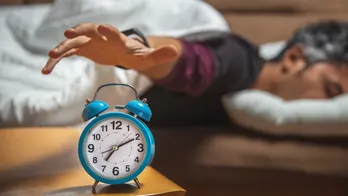Ask a doc: 'Is it dangerous to crack my neck or back?'
Cracking your back or neck might provide quick relief and a satisfying popping noise — but is it a safe practice?
"When you stretch or manipulate your spine, such as by twisting or bending, the pressure within the joint changes," Dr. William Kemo, a neurosurgeon at the Virginia Spine Institute, told Fox News Digital.
"This can cause a sudden release of gas bubbles, leading to a cracking sound."
BE WELL: KEEP YOUR BONES STRONG TO PREVENT OSTEOPOROSIS
People often crack their back or neck out of habit, or to temporarily relieve tension or stiffness, Kemo noted.
"Typically, they do this to loosen up their back or neck when it is feeling tight or stiff. The ‘cracking’ is the popping of a tight or stiff facet joint."

People often crack their back or neck out of habit to temporarily relieve tension or stiffness, a doctor noted. (iStock)
While the act of cracking can release endorphins (feel-good chemicals) for temporary relief, it doesn’t address the source of the tension, according to Tori Hartline, a chiropractor at Sunlife Chiropractic in Frisco, Texas.
ASK A DOC: 'HOW CAN I IMPROVE MY POSTURE?'
Popping or cracking can even lead to injury, she warned.
"Chiropractors are trained to look for restricted areas in the spine and perform specific adjustments to decrease tension and improve range of motion," Hartline said.

Cracking your back or neck can cause a myriad of health issues, experts are warning. (iStock)
"When an individual tries to pop their own back or neck, the segments that release gas are hypermobile segments versus the area of restriction. The joints above and below the area of restriction will move too much to compensate."
She added, "Therefore, these cracks do not address the problem and can instead lead to further injury."
The impacts of cracking your back or neck can include joint hypermobility, sprains or strains due to taking the joint too far past its proper range of motion — and even a fracture if too much pressure is applied, Hartline noted.
FOR ACUTE LOWER BACK PAIN, THESE ARE THE BEST MEDICATIONS, NEW STUDY FINDS
Kemo agreed, warning that cracking your back can cause unnecessary wear and tear on your spine.
"It may lead to strain on the muscles and ligaments surrounding the spine, potentially causing injury or exacerbating existing issues," he added.

One expert suggested seeing a licensed chiropractor to identify areas of restriction and prescribe therapeutic exercise and stretches. (iStock)
It's especially dangerous to crack the neck, which could impede blood flow and, in very rare cases, could increase stroke risk, according to Dr. Todd Sinett, a chiropractor at Tru Whole Care in New York.
Alternatives to cracking
There are plenty of safe alternatives that will provide longer-term relief without exacerbating potential issues with the spine, Kemo said.
"Commit to a daily stretching routine, and engage in core muscle exercises to strengthen the muscles supporting the spine," he recommended.
WHAT IS SCOLIOSIS? CAUSES AND SYMPTOMS OF THE SPINAL CONDITION, TREATMENT PLANS AND MORE
Regular physical activity can also be helpful.
"A body in motion stays in motion, and helps avoid stiffness and alleviates tension," Kemo said.
The doctor also suggested optimizing your ergonomics at home, at work and in the car.

Committing to a daily stretching routine and engaging in core muscle exercises can help strengthen the muscles supporting the spine, one doctor said. (iStock)
"Examine your daily routines to see if there may be repetitive situations that leave you feeling stiff or experiencing tension/tightness," Kemo suggested.
This might include hunching in your chair or seat in the car, holding your device and looking down for prolonged periods, or sleeping in a certain position.
CLICK HERE TO SIGN UP FOR OUR HEALTH NEWSLETTER
Hartline also suggested seeing a licensed chiropractor, who can identify the areas of restriction and prescribe therapeutic exercise and stretches to give you the best results.
"If you're experiencing persistent discomfort or pain, it's best to consult with a medical specialist for proper evaluation and treatment."
Overall, both experts agree that it's important to listen to your body and avoid forceful manipulation of the spine.
"If you're experiencing persistent discomfort or pain, it's best to consult with a medical specialist for proper evaluation and treatment," Kemo said.
CLICK HERE TO GET THE FOX NEWS APP
"Remember, what works for one person may not be suitable for another — so personalized guidance is key."
For more Health articles, visit www.foxnews.com/health.
Disclaimer: The copyright of this article belongs to the original author. Reposting this article is solely for the purpose of information dissemination and does not constitute any investment advice. If there is any infringement, please contact us immediately. We will make corrections or deletions as necessary. Thank you.







